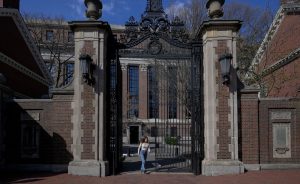California’s Lieutenant Governor, Eleni Kounalakis, has not officially handled Greek-American relations, but she has played a key role in fostering diplomatic ties between the two nations. In an interview with To Vima during the Democratic National Convention, Kounalakis discussed the growing relationship between Vice President Kamala Harris and Greek Prime Minister Kyriakos Mitsotakis—a connection she helped initiate.
Kounalakis, facilitated their first meeting at the Munich Security Conference in 2022, persuading her close friend Harris to meet with Mitsotakis despite a demanding schedule.
Wearing blue and a medallion of the ancient Greek goddess Athena, symbolizing her heritage, Kounalakis highlighted the importance of this personal relationship during the interview.
As she said, “I know that they already share a very close bond and a personal relationship that when she wins will carry forward in the bilateral relationship between Greece and the U.S.”
Kounalakis also reflected on the support she has received from the Greek-American community throughout her career, pointing to opportunities for collaboration between California and Greece in sectors such as technology, tourism, and wildfire management.
Having served as U.S. Ambassador to Hungary under President Obama, Kounalakis speaks with conviction about Harris’s readiness to lead, emphasizing her experience and capability as key assets that prepare her to potentially become the first female President of the United States.
She also does not shy away from addressing the dangers she sees in a possible return of Donald Trump to the White House, describing him as a clear threat to American democracy.
Reflecting on her run for California governor, Kounalakis’ insights offer a glimpse into her broader vision—one that bridges her two beloved homelands and reinforces the democratic values that the U.S. and Greece share.
You know Kamala Harris personally. What’s something about her that most people don’t know but should?
Well, Kamala Harris is going to be very well known after this week because that is what our week here at the convention really is all about. For Californians, we do know her very well because she was our attorney general, she was our U.S. senator for a while, and she has been a leader for us for a long time. I think that what the world is already seeing is a person who is enormously capable, very experienced, who cares about Americans, and now who after three and a half years of being vice president of the United States is ready to take on that mantle of leadership both here domestically and internationally.
How do you feel about the possibility of the first female President? Are there still systemic barriers for women that the U.S. needs to overcome?
You know, it is a work in progress, and there is no question that Kamala Harris is fighting to break what we call the highest, hardest marble ceiling in politics. And Hillary Clinton, who spoke last night, made millions of cracks in that marble ceiling, but now it is up to Kamala with the support of millions of people, women and men, who believe in her and know she is the right person for the job. When it happens, it changes things for the next generation. So, we are all very hopeful, but there is so much stake in this election that goes beyond just the fact that she will break this barrier.
What is at stake is our democracy and really being able to continue to have a White House that serves the people, that keeps a level of rational thinking and decency and consistency with our rule of law. So, there is a lot at stake and certainly, that is one thing that will come along with being able to elect her in November.
You mentioned that democracy is at stake. Do you consider Donald Trump a threat to American democracy?
He is a threat to American democracy. I don’t even think it is a question. He said in no uncertain terms that he would like to be a dictator on day one. Plato, who was skeptical about elements of democracy, warned us against demagoguery. He said democracy is complicated, and it is difficult to have a system of shared power. If the democracy is given problems that are too hard to solve, someone will come along with a lot of charisma and say, I alone can fix it.
But what we saw when he was in office the first time is that he did not fix anything. He did not fix the challenges with immigration. He did not fix the fact that people are losing their jobs because of changes in the way that our economy works. And he certainly did nothing for the working families, for women, for the people who get up every day trying to take care of their families. So, we tried it with him. It was a disaster and a failure. And now we need to make sure that his brand of demagoguery does not come back because it will be disastrous, not just for our country, but for the world.
You are one of the highest-ranking Greek-American political leaders. Is the Greek American community politically active and how has it supported you?
The Greek American community is very visible and very supportive of their candidates. And by the way, I will say some of us are Democrats, others like Gus Bilirakis are Republicans, and so it spans the spectrum. But I remember Nancy Pelosi once telling me that when she would travel from state to state with congressional members all over the country and they would introduce her to their core supporters, she said, ‘you know, Eleni, it’s funny, but there was almost always a Greek in the room.’
And that has made me very proud. So even though Greek Americans, by our numbers, are not one of the largest ethnic groups, we are very, very visible. And I do believe it is because we have the gift of our legacy of democracy and the history that we bring, but also because, you know, in even the modern history of Greece, we know how important it is to be involved in our own governance. And I can tell you my own father, Angelo Tsakopoulos, always raised me to believe and my siblings that it’s an incredible privilege that we can be involved in our own governance.
People in Greece get very enthusiastic or very disappointed about support from the United States. What’s the biggest misconception in the public opinion about the Greek-American lobby?
I think that Greek-Americans in our bilateral person-to-person relationships have really delivered. You know, I think that we have seen that in action, particularly over the last few years. The Greek community has been very, very close to President Biden. President Biden visited Greece many times. He visited the (Ecumenical) Patriarchate and many times engaged with Greece’s government leaders, as well as religious leaders, and really has understood the importance of Greece in the region, but also throughout history being one of the best and most reliable partners of the transatlantic relationship.
So, I think that that has been very much on display by the way President Biden sent a Greek American, George Tsunis, to be ambassador. And I will also say I am very proud of this over the last three and a half years to see the relationship that Vice President Harris and Prime Minister Mitsotakis have built. They have been together at international conferences, at Munich, and I know that they already share a very close bond and a personal relationship that when she wins will carry forward in the bilateral relationship between Greece and the U.S.
Given your familiarity with Kamala Harris’ foreign policy team, how do you think her administration would approach Greek-Turkish relations and the Cyprus issue? What changes could we expect compared to the Biden administration?
I think the most important thing is that she really has invested her time and effort learning and working from the President, who himself has 50 years of experience in national security. That gives her an extraordinary foundation. She is one of the most qualified candidates for president when it comes to foreign policy that we have seen in the last 20 years. She is right up there. I think it is clear with President Biden, before that on the Republican side, I think you have to go back to George H.W. Bush who had that experience.
But in terms of what I think it means for Greece, I would look to her valuing our NATO alliances and having that transatlantic orientation and the value of the transatlantic orientation. I see that at the core, particularly with the advisors around her, Phil Gordon, for instance, and others. At the same time, she went to Asia several times. She herself has her own heritage in India. And with the challenges with Asia right now, I think that is going to be very important and a priority for her as well.
As a candidate for Governor, do you see opportunities for partnerships between California and Greece? And if yes, in what areas would you like to focus?
My two favorite places in the world are California and Greece and we have a lot in common. We are both very important tourist destinations. We are symbols of things that are larger than just our own territories that go to things like freedom and personal expression and we also frankly have been challenged by extreme weather.
We have had some important collaboration in the past on combating wildfires but I do see the ability to do a lot more in terms of collaboration. I will also say that a lot of tech entrepreneurs are coming out of Greece. California is the innovation capital of the world. So, I very much hope that California will have its first Greek-American governor for a long time but I also look forward to a great deal of collaboration in the future.
https://t.co/CdjsZXrO57
By Petros Kasfikis#tovimacom #California #Μητσοτακης #KamalaHarris pic.twitter.com/RKkNZw57yH— tovima.com (@tovimacom) August 21, 2024



